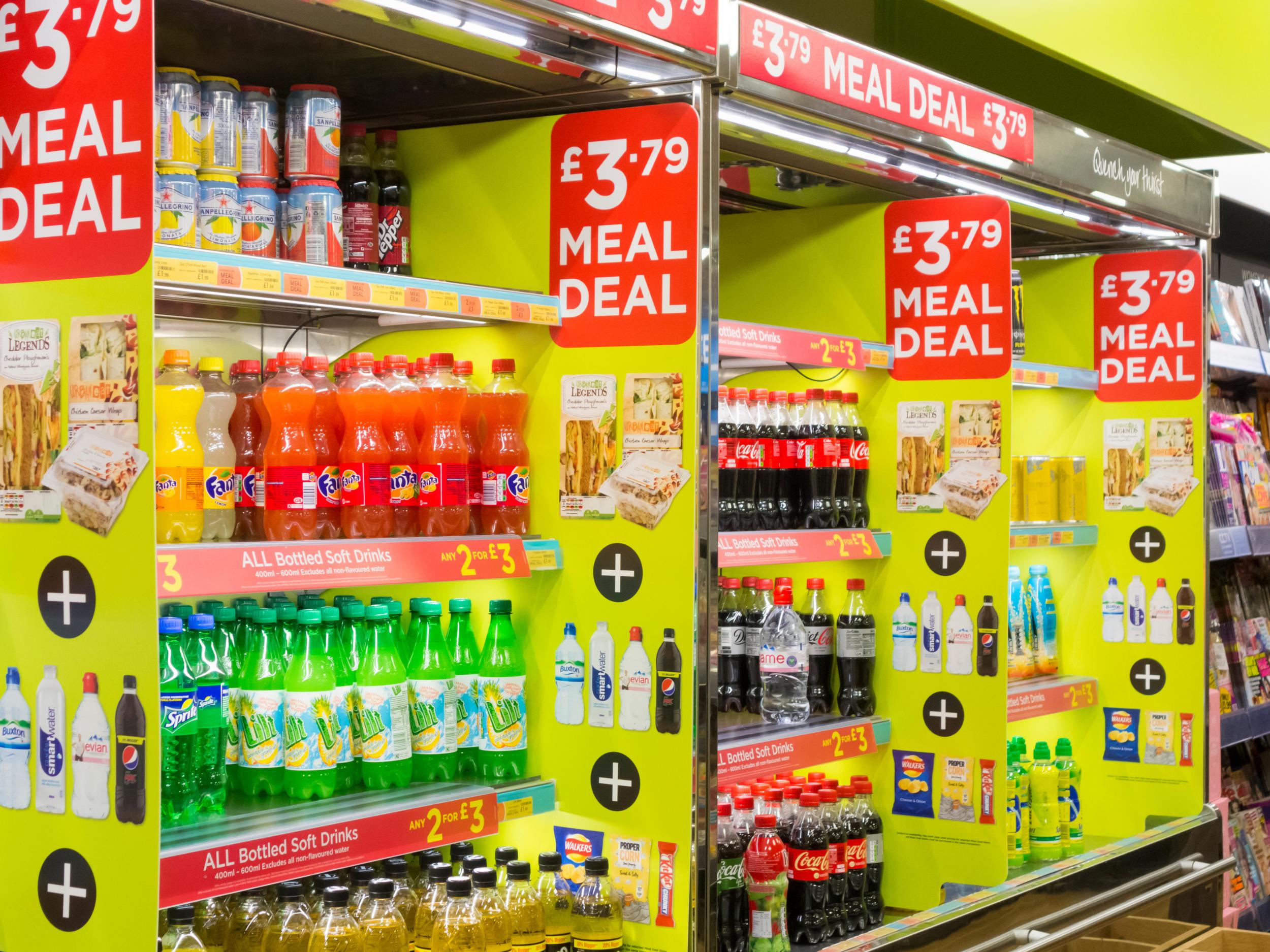How meal deals could undo the benefits of the sugar tax
The sugar tax relies on creating a price difference between high- and low-sugar drinks, but this could be cancelled out by bundled offers, such as fixed-price meal deals

Your support helps us to tell the story
This election is still a dead heat, according to most polls. In a fight with such wafer-thin margins, we need reporters on the ground talking to the people Trump and Harris are courting. Your support allows us to keep sending journalists to the story.
The Independent is trusted by 27 million Americans from across the entire political spectrum every month. Unlike many other quality news outlets, we choose not to lock you out of our reporting and analysis with paywalls. But quality journalism must still be paid for.
Help us keep bring these critical stories to light. Your support makes all the difference.
From April, the government’s sugar tax will make 500ml bottles of high-sugar drinks cost an extra 14p, and two litre bottles an extra 58p. The higher price is intended to steer people towards choosing lower-sugar drinks. But promotions, such as “meal deals”, could make the sugar tax meaningless by negating the price difference.
The sugar tax will apply to fizzy drinks, squashes and juice drinks with more than 5g or 8g of sugar per 100ml, adding 22p and 29p per litre respectively to the price, including VAT. Places that have already got a sugar tax, such as Mexico and Berkeley, California, have found that the higher price does make people drink less. But Public Health England’s (PHE) approach is slightly different because it has set two levels of tax and given manufacturers plenty of time to lower the sugar content of their drinks to be below the sugar tax thresholds.
Since the sugar tax was announced in April 2016, manufacturers have been steadily altering their recipes, (known as “reformulation”) to have 20-50 per cent less sugar. This has been so successful that forecasts of how much money the sugar tax will generate in the first year have shrunk from £520m to £385m, and may be even lower. The approach is being held up worldwide as a shining example of how to get manufacturers to make food healthier.
Much of this reformulation has been hidden, with no clear message to consumers that the product has changed. But while some drinks producers, such as Tesco and Lucozade Ribena Suntory, have reduced sugar across their entire range, others have taken a different approach.
Coca-Cola and Britvic (the licensed bottler of Pepsi in the UK) have lowered the sugar in most of their drinks, but kept Coca-Cola Classic and Pepsi unchanged. These full-sugar versions contain about 53g sugar per 500ml bottle (around 14 sugar cubes), so there will be a 14p sugar tax to pay.
Passing the can
The drinks industry says the size and scale of the sugar-tax bill is too much for them to absorb, so they will pass the cost on to retailers. Retailers are likely to do the same and pass the cost onto consumers. This is what PHE intended; high-sugar drinks should cost more to make them less attractive to buy. But the tax may have an unintended consequence on drinks purchased in meal deals, which typically include a sandwich, a snack and a drink.
Young people are the biggest consumers of sugar-sweetened drinks and have been a key target of PHE’s sugar-reduction strategy. Meal deals are popular and widely available in student environments, from on-campus supermarkets, students union shops and express supermarkets.
Our research with students (aged 16-19 and 19-24) found that they decided what to buy in a meal deal based on price and “getting a bargain”. Students tend to choose the most expensive drink in order to maximise the cost benefit of the deal, even though they are often aware of the health aspects.
When the sugar tax comes into force and full-sugar drinks cost more, this may create a perverse incentive because choosing the more expensive drink will increase the relative discount/cost effectiveness achieved by buying a meal deal.
The UK has more special offers and price promotions on food and drinks than anywhere else in Europe and PHE has set “reducing and rebalancing” price promotions in its sights for future action. In the meantime, the drinks industry is doing its bit, lowering sugar but retaining choice.
Now it is over to retailers and other drinks outlets to act in the spirit of the sugar tax by passing the higher price on to consumers and keeping a price difference between high- and low-sugar drinks.
For meal deals, there are three options: add the sugar tax to the price of the meal deal when a full-sugar drink is chosen, take sugary drinks that are taxed out of the meal deal, or do nothing and risk encouraging people to choose the full-sugar version, undermining everything PHE is trying to achieve.
Carol Williams is a principal lecturer: health promotion and public health at the University of Brighton. This article first appeared on The Conversation (theconversation.com)
Join our commenting forum
Join thought-provoking conversations, follow other Independent readers and see their replies
Comments